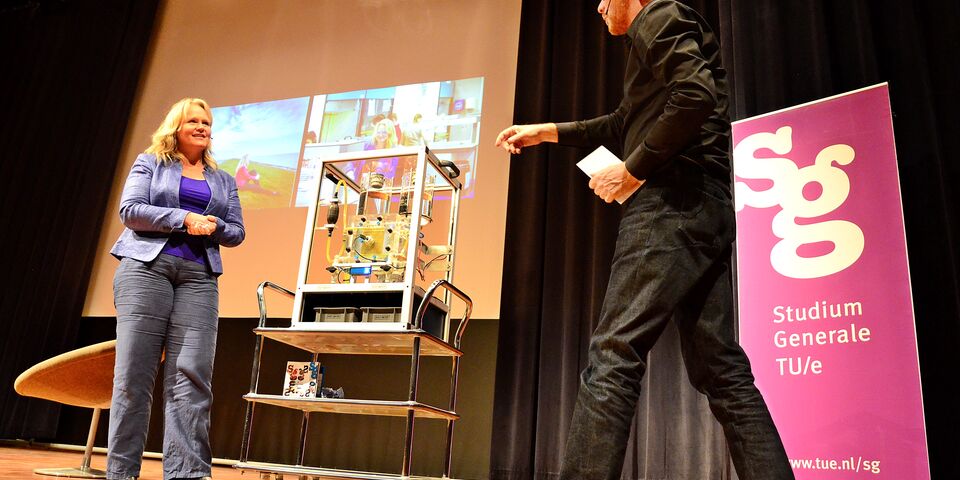Talking about ambition, uncertainty and, of course, the research itself
Anyone who attended the SG interview session conducted Wednesday afternoon by Jan van den Berg with Professor Kitty Nijmeijer now knows that membrane technology is an integral part of the human body. Your kidneys, lungs and each and every cell wall are continually separating the harmful agents from the good ones. Nijmeijer spoke passionately about her research, about what motivates her, but also about experiencing uncertainty and work pressure.
It was the creativity and diversity that attracted Kitty Nijmeijer, who since 2016 has been working at the Department of Chemical Engineering and Chemistry, to science at a young age. An uncle from Apeldoorn triggered her interest with a chemistry experiment; at home this field of knowledge didn't feature. “The rest of my family is more interested in law and languages,” explained Nijmeijer.Her parents have always encouraged her to pursue this scientific course and nor personally has she ever felt any hesitation about entering a world populated mainly by men. “I've never it paid any attention, at the end of the day I've simply pursued my interests." She was introduced to membrane technology during an internship.As it does for many, working in science takes its toll on her social life, as she readily admits. “My husband still lives in Enschede, because before I came to Eindhoven I worked at the University of Twente. So weekdays I am here and weekends I'm in Enschede. My evenings and weekends too are usually often filled with work-related matters. Hard work is simply part and parcel of being a professor.”
Most sustainable society
In this phase of her career, she says, the question of how she can use her research to contribute towards a better, more sustainable society has become a greater preoccupation. “I used to be more focused on my own position and on opportunities to advance my career. That certainly involved some doubt: am I actually good enough, and will I receive recognition for my work?”In the Blauwe Zaal, Nijmeijer uses a few simple experiments to show how membranes can be produced and their uses. The installation that generates energy by having salt water pass through a membrane towards fresh water is striking. Time for an explanation of the exact procedure is lacking, but Nijmeijer does show a photograph of the Dutch Afsluitdijk, which since the end of 2014 has been the site of a large test installation, set up in cooperation with the company REDstack.“Collaboration with industry is something I am keen on because it offers me the chance to translate fundamental knowledge into practical solutions. And with these people you find you are speaking the same language.”Finally, she is asked why she believes it is so important to communicate about her research. “I find it really enjoyable and really important. Anyone who turns on the faucet finds it completely normal that every day it gushes clean drinking water, but that is absolutely not the case. That's what I want to talk about, and about the fact that chemistry is present all around us every day.”







Discussion